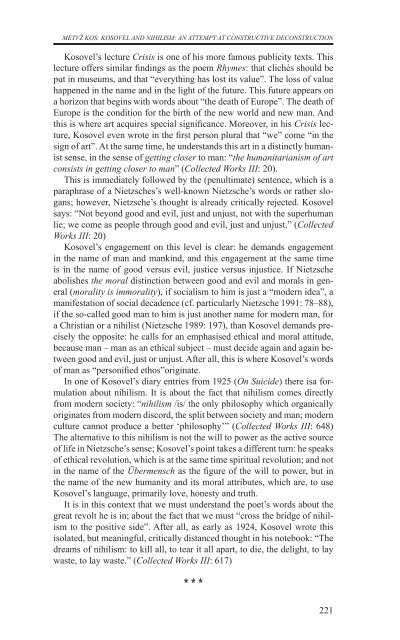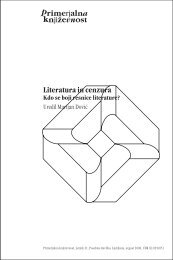razprave (pdf) - Društvo za primerjalno književnost - ZRC SAZU
razprave (pdf) - Društvo za primerjalno književnost - ZRC SAZU
razprave (pdf) - Društvo za primerjalno književnost - ZRC SAZU
- No tags were found...
You also want an ePaper? Increase the reach of your titles
YUMPU automatically turns print PDFs into web optimized ePapers that Google loves.
METVŽ KOS: Kosovel and Nihilism: An Attempt at Constructive DeconstructionKosovel’s lecture Crisis is one of his more famous publicity texts. Thislecture offers similar findings as the poem Rhymes: that clichés should beput in museums, and that “everything has lost its value”. The loss of valuehappened in the name and in the light of the future. This future appears ona horizon that begins with words about “the death of Europe”. The death ofEurope is the condition for the birth of the new world and new man. Andthis is where art acquires special significance. Moreover, in his Crisis lecture,Kosovel even wrote in the first person plural that “we” come “in thesign of art”. At the same time, he understands this art in a distinctly humanistsense, in the sense of getting closer to man: “the humanitarianism of artconsists in getting closer to man” (Collected Works III: 20).This is immediately followed by the (penultimate) sentence, which is aparaphrase of a Nietzsches’s well-known Nietzsche’s words or rather slogans;however, Nietzsche’s thought is already critically rejected. Kosovelsays: “Not beyond good and evil, just and unjust, not with the superhumanlie; we come as people through good and evil, just and unjust.” (CollectedWorks III: 20)Kosovel’s engagement on this level is clear: he demands engagementin the name of man and mankind, and this engagement at the same timeis in the name of good versus evil, justice versus injustice. If Nietzscheabolishes the moral distinction between good and evil and morals in general(morality is immorality), if socialism to him is just a “modern idea”, amanifestation of social decadence (cf. particularly Nietzsche 1991: 78–88),if the so-called good man to him is just another name for modern man, fora Christian or a nihilist (Nietzsche 1989: 197), than Kosovel demands preciselythe opposite: he calls for an emphasised ethical and moral attitude,because man – man as an ethical subject – must decide again and again betweengood and evil, just or unjust. After all, this is where Kosovel’s wordsof man as “personified ethos”originate.In one of Kosovel’s diary entries from 1925 (On Suicide) there isa formulationabout nihilism. It is about the fact that nihilism comes directlyfrom modern society: “nihilism /is/ the only philosophy which organicallyoriginates from modern discord, the split between society and man; modernculture cannot produce a better ‘philosophy’” (Collected Works III: 648)The alternative to this nihilism is not the will to power as the active sourceof life in Nietzsche’s sense; Kosovel’s point takes a different turn: he speaksof ethical revolution, which is at the same time spiritual revolution; and notin the name of the Übermensch as the figure of the will to power, but inthe name of the new humanity and its moral attributes, which are, to useKosovel’s language, primarily love, honesty and truth.It is in this context that we must understand the poet’s words about thegreat revolt he is in; about the fact that we must “cross the bridge of nihilismto the positive side”. After all, as early as 1924, Kosovel wrote thisisolated, but meaningful, critically distanced thought in his notebook: “Thedreams of nihilism: to kill all, to tear it all apart, to die, the delight, to laywaste, to lay waste.” (Collected Works III: 617)* * *221
















